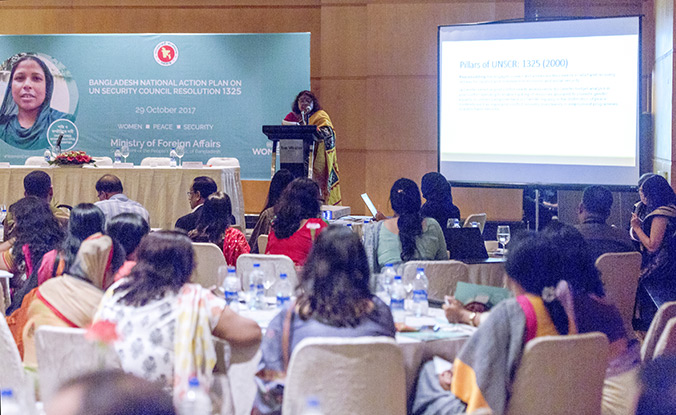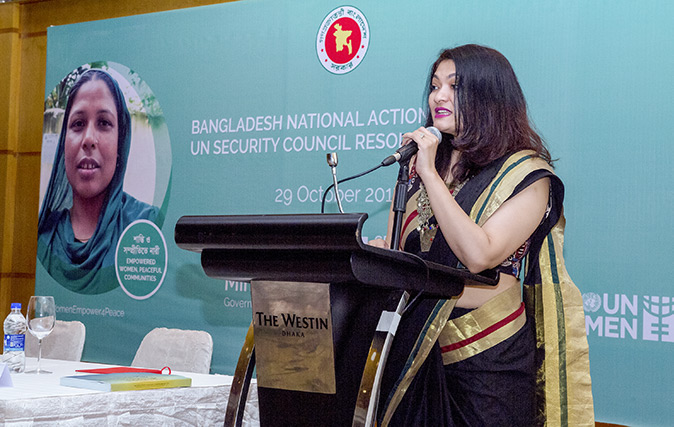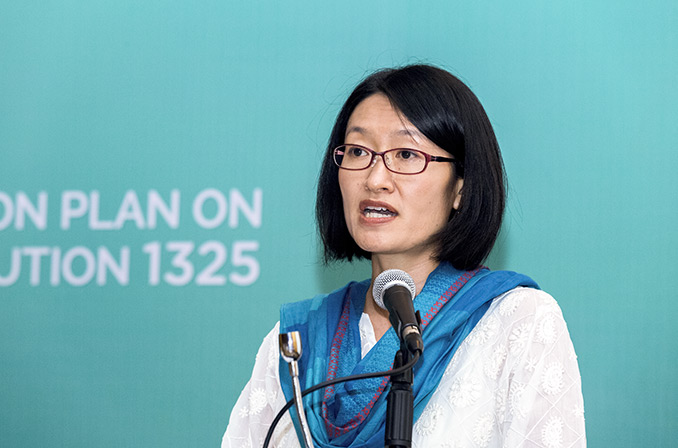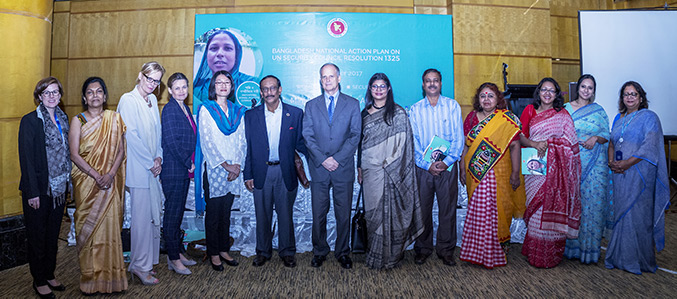Bangladesh starts drafting National Action Plan on Women, Peace and Security
Date:
Author: Asma Afrin Haque
Dhaka, Bangladesh — UN Women and Bangladesh's Ministry of Foreign Affairs have jointly launched the drafting of a National Action Plan to implement United Nations Security Council Resolution 1325, which calls for increasing women's participation in efforts to maintain peace and security.

Officials and delegates from government ministries, United Nations agencies, international NGOs, foreign diplomatic missions, and many civil society organizations attended the launch ceremony in Dhaka on 29 October.

The landmark Resolution 1325 was adopted in 2000 under the initiative of Bangladesh as a non-permanent member of the Security Council. With the Resolution, the international community for the first time recognized the disproportionate and unique impact of armed conflicts and crises on women and girls, and called for the direct participation of women and girls in bringing about and maintaining peace and security. The Security Council recommended that States adopt National Action Plans to facilitate implementation of 1325 and subsequent resolutions. To date, nearly 70 states have adopted such plans.
Bangladesh's National Action Plan will encompass all strategic and practical issues involved in the four pillars of the Women, Peace and Security Agenda: Participation, Prevention, Protection, and Relief and Recovery.

"Our commitment to attending the objective of the Sustainable Development Goals and our Women Development policy have set the right environment for implementation of this Resolution 1325," said Sadia Faizunnesa, the Director General-UN of Ministry of Foreign Affairs. "On top of that, we have rich experience in working with vibrant civil society organizations and NGOs working on various issues related to women for many years. The Government supports and promotes women as actors of peace. Our National Action Plan on 1325 will reflect these commitments."
Shoko Ishikawa, Country Representative of UN Women, and Robert D. Watkins, United Nations Resident Coordinator in Bangladesh, both congratulated the Government for starting the process. Ms. Ishikawa highlighted the important role of UN Women's partner Bangladesh Nari Progati Sangha in coordinating with civil society organizations across the country to obtain community input for developing the National Action Plan.
Md. Shahidul Haque, Secretary of the Ministry of Foreign Affairs, said the Government has been working to ensure justice for women not just in Bangladesh, but also globally with its efforts to end sexual exploitation and abuse by United Nations peacekeepers.
Mr. Md. Haque stressed that community participation is fundamental to a National Action Plan's success. "The most important part of any National Action Plan is the people's awareness about the plan," he said. "It's the people who implement the plan. The reason why I'm using the word people is both men and women together have to implement the plan. It is not a National Action Plan for women, it's a National Action Plan for people."

The development of the National Action Plan will be led by Meghna Guhathakurta, a former professor of international relations at the University of Dhaka and currently the Executive Director at Research Initiatives Bangladesh. At a workshop, Prof. Guhathakurta presented the methodology for drafting a plan that would unlock women's potential as decision makers, peacekeepers and peacebuilders in the context of Bangladesh. Government agencies, civil society organizations and other groups will be consulted, and their recommendations will be incorporated into the plan.